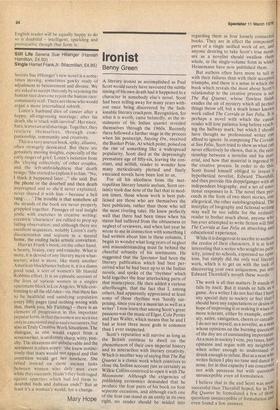Iron ist
Benny Green
A literary ironist as accomplished as Paul Scott would surely have savoured the subtle timing of his own death had it happened to a character in somebody else's novel. Scott had been toiling away for many years without once being discovered by the fashionable literary crackpots. Recognition, for what it is worth, came belatedly, as the instalments of his Indian quartet revealed themselves through the 1960s. Recently there followed a further stage in the process when his postscript, Staying On, received the Booker Prize. At which point, poised on the rim of something like a widespread popularity, Scott died at the depressingly premature age of fifty-six, leaving the constant, and selfish, reader to wonder how many meticulously plotted and finely executed novels have been lost to us.
For all his aloofness from the metropolitan literary lunatic asylum, Scott certainly took due note of the fact that in modern times, those whose work is best publicised are those who are themselves the best publicists, rather than those who tell the most riveting tales. He knew perfectly well that there had been times when his status had suffered from the obtuseness or neglect of reviewers, and when last year he wrote to me in connection with something I had written about him in these columns, I began to wonder what long years of neglect and misunderstanding must lie behind the cheerful urbanity of his sentiments. He suggested that the Spectator had been the literary publication which had best perceived what he had been up to in the Indian novels, and spoke of the 'rhythms' which held together the four interlocking parts of that masterpiece. He then added a curious afterthought, that the fact that I, among others, had apparently appreciated at least some of those rhythms was 'hardly surprising, since you are a musician as well as a writer'. I now learn that among Scott's great passions was the music of Elgar, Cole Porter and Fats Waller, which means that he and I had at least three more gods in common ' than I ever suspected.
Scott's reputation will survive as long as the British continue to dwell on the phenomenon of their own imperial history and its interaction with literary creativity. Which is another way of saying that The Raj Quartet is a classic work which contrives to close the Indian account just as certainly as Wilkie Collins contrived to open it with The Moonstone. Although the exigencies of publishing economics demanded that he produce the four parts of his book on four separate occasions, and although each one of the four can stand as an entity in its own right, no reader should be misled into
regarding them as four loosely connected books. They are in effect the component
parts of a single unified work of art, and anyone desiring to take Scott's true measure as a novelist should swallow then' whole, in the single-volume form in which Heinemann have now published them.
But authors often have more to tell us with their failures than with their accepted triumphs, and there is a sense in which the book which reveals the most about Scott s relationship to the creative process is not The Raj Quartet, whose flawless finish exudes the air of mystery which all perfect things throw off, but a much lesser knovuu work called The Corrida at San Feliu. It is perhaps a novel with which the casual reader will lose patience long before reaching the halfway mark, but which I should have thought no professional writer can afford to ignore. In composing The Corrida at San Feliu, Scott tried to show us what ca0 never effectively be shown, that is, the relationship between a novelist and his material, and how that material is ingested by the creative process. In order to do this Scott found himself obliged to invent a hypothetical novelist, Edward Thornhill, and then provide this doppelganger with an independent biography, and a set of emotional responses to it. The novel then prcr ceeds in the form of two short stories, one
allegorical, the other autobiographical. Thu interplay of biography and fictional writing
may well be too subtle for •the ordinary reader to bother much about, anyone whd has ever attempted to write fiction will find The Corrida at San Feliu an absorbing and educational experience.
While it is dangerous to ascribe to authors the credos of their characters, it is at least interesting that a writer who sought no pail' icity, joined no schools, expressed no opin" ions, but simply did the only real literarY,
work, which is to get on with the task or discovering your own uniqueness, put int() Edward Thornhill's mouth these words: The work is all that matters. It stands of falls by itself. But it stands or falls as 0 game. As a writer! do not feel that I have, any special duty to society or feel that should have any expectations or desire or hope of improving it or making it wiser or more tolerant, either by example, entre' aty, satire, castigation, cheers or catcalls. I do not see myself, as a novelist, as a ma° whose opinions on the burning questions of the day are of outstanding importance' As a man in society I vdte, pay taxes, have opinions and argue with my neighbouf when sober enough to understand of drunk enough to refute. But as a man wh° writes fiction! play no tune and dance t°, none, for in that capacity I am concerneu not with panaceas but with questions unsusceptible even of formulation.
I believe that in the end Scott was more successful than Thornhill hoped, for in Pie Raj Quarrel he formulated a few of those questions unsusceptible of formulation and even found a few answers.


































 Previous page
Previous page